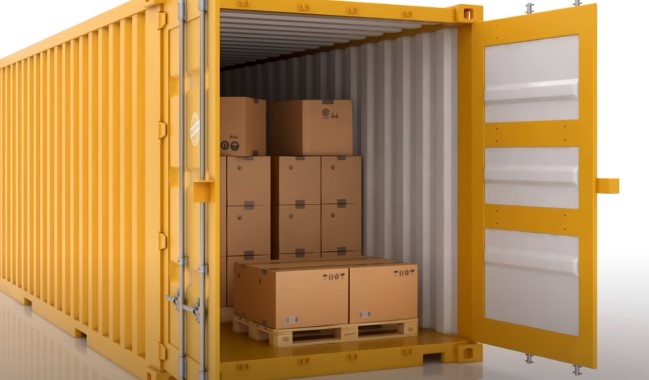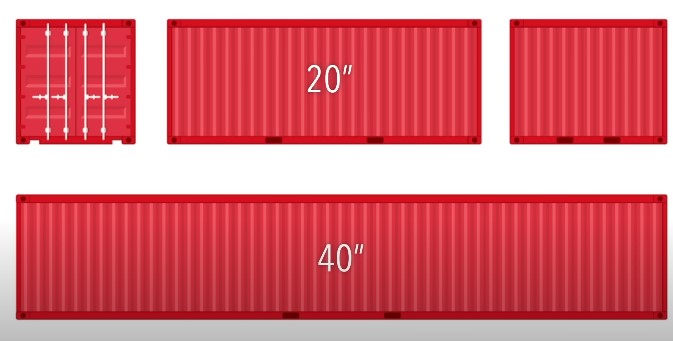Embarking on a new chapter in life by moving to another country is an exciting prospect, but it’s crucial to plan. Amidst the thrill, one burning question arises: “How much does it cost to make this international leap?”
We will unravel the expenses involved and equip you with the insights you need for a seamless transition.
How Much Does It Cost to Move to Another Country?
The cost of moving to another country varies depending on how you approach your expenses. If you’re looking for a budget-friendly option, it can be as economical as purchasing a one-way flight ticket.
Conversely, if you’re fortunate enough to have a corporate international relocation package, your employer may cover all the costs associated with your move. According to relocation experts, a general estimate for renters moving overseas falls within the range of the low to mid-$20,000s.
However, for homeowners, the average cost of an international move typically falls between $60,000 and $80,000, serving as a benchmark for those seeking a permanent transition abroad.

Cost-Related Factors of Moving to Another Country?
When it comes to moving to another country, there are various cost-related factors to consider. Understanding these factors can help you plan and budget for your international move more effectively. Here are some of the key aspects that can influence the expenses involved in relocating abroad.
Visa and Immigration Fees
One of the primary cost considerations when moving to another country is the visa and immigration fees. Each country has its own set of regulations and requirements for obtaining a visa or residency permit. These fees can vary significantly depending on the country and the type of visa you are applying for.
It is important to research the specific immigration fees for your destination country and factor them into your budget.
Transportation Costs
The cost of transportation to your new country is another significant factor to consider. Whether you are moving by air, sea, or land, transportation expenses can add up quickly.
Airfare is typically the most expensive option, especially if you are traveling with a significant amount of luggage or shipping belongings separately.
If you are moving with your household items, you may also need to consider the cost of shipping or hiring a moving company, which can vary depending on the volume and weight of your belongings.
Housing Costs

Finding suitable housing in your new country is essential, and it’s crucial to understand the associated costs. Rent prices, property values, and utility expenses can vary significantly from one country to another.
Research the housing market in your destination country to get an idea of the average rental or purchase prices. Keep in mind that some countries may require a significant deposit or advance payment for rentals, which can add to your initial costs.
Cost of Living
The cost of living in your new country is a vital factor to consider, as it will impact your day-to-day expenses. The prices of groceries, transportation, dining out, healthcare, and other essentials can vary greatly from country to country.
Research the cost of living index [1] for your destination to estimate your future expenses accurately. This will help you determine if your current income or savings will be sufficient to cover your needs in the new country.

Health Insurance
Health insurance is a critical consideration when moving abroad. The cost of healthcare and insurance coverage can vary significantly from country to country. Some countries have universal healthcare systems, while others require residents to have private health insurance.
Research the healthcare system and insurance options available in your destination country to understand the costs and ensure you have appropriate coverage for yourself and your family members.
Education Costs
If you have children, education costs will be an important factor to consider. International schools or schools that offer education in your native language can be quite expensive. Tuition fees, uniforms, books, and other school-related expenses can add up quickly.
Research the education system in your destination country and consider the options available to provide the best education for your children while staying within your budget.

Taxes and Financial Considerations
Moving to another country can have implications for your taxes and financial situation. It is essential to understand the tax laws and regulations of both your home country and your destination country.
You may need to hire a tax professional who specializes in international taxation to ensure you comply with all the requirements and optimize your financial situation.
Additionally, consider the cost of converting currency, opening new bank accounts, and any fees associated with international banking transactions.
Relocation Services
Depending on your circumstances and preferences, you may choose to hire relocation services to assist you with various aspects of your move. These services can include finding housing, obtaining visas, shipping belongings, and even providing cultural orientation.
While these services can be convenient, they also come with a price tag. Research different relocation service providers, compare their offerings and costs, and decide if investing in such services aligns with your needs and budget.

Language and Cultural Training
Moving to a new country often involves adapting to a different language and culture. If you do not speak the local language or are unfamiliar with the customs, you may consider investing in language courses or cultural training. These expenses can vary depending on the intensity and duration of the courses.
Consider whether you or your family members will need language and cultural training and budget accordingly.
Miscellaneous Expenses
Finally, it is important to account for miscellaneous expenses that may arise during your move and settlement in a new country. These can include initial setup costs such as furniture, kitchen appliances, and other household items.
You may also need to factor in the cost of transportation within the country, such as purchasing a car or using public transportation. Additionally, don’t forget to consider the expenses associated with connecting utilities, obtaining new identification documents, and registering with local authorities.
Moving to another country involves various cost-related factors that need to be considered and planned for. By researching and understanding these factors, you can better prepare yourself financially for a smooth transition to your new home.

How You Can Save Money When Moving to Another Country?
Moving to another country can be an exciting adventure, but it can also be a significant financial undertaking. However, there are several ways you can save money during the process and make your international move more cost-effective.
Here are some practical tips to help you save money when moving to another country:
Plan and Budget
Start by creating a detailed plan and budget for your move. Research the cost of living, housing, transportation, and other essential expenses in your destination country. This will give you a clear understanding of the financial requirements and help you identify areas where you can potentially save money.
Declutter and Downsize
Moving abroad provides a great opportunity to declutter and downsize your belongings. Go through your possessions and sell, donate, or discard items that you no longer need or use.
This will not only reduce the volume and weight of your shipment, potentially lowering shipping costs but also allow you to start fresh in your new country without unnecessary clutter.

DIY Packing and Shipping
Instead of hiring professional packers and movers, consider packing and shipping your belongings yourself. This can significantly reduce costs, especially if you opt for cheaper shipping methods such as sea freight.
Be sure to research the customs regulations and any import duties or taxes that may apply to your shipments to avoid unexpected expenses.
Sell or Rent Out Your Property
If you own a property in your home country, consider selling or renting it out. Selling your property can provide a significant financial boost while renting it out can generate passive income that can help cover some of your expenses in the new country.
Explore these options and decide which one aligns best with your long-term plans and financial goals.
Research Affordable Housing Options
Look for affordable housing options in your destination country. Consider renting a smaller apartment or sharing accommodations to save on rent. Explore different neighborhoods and compare rental prices to find the most cost-effective option that still meets your needs.

Additionally, negotiate the terms of your lease and try to secure a favorable rental rate.
Utilize Relocation Packages or Assistance
If you are moving for work or your company offers relocation packages, take advantage of the benefits they provide. Some companies cover housing expenses, and shipping costs, or even provide a lump sum to assist with the move.
Discuss the relocation benefits with your employer and explore all available options to maximize the financial assistance you can receive.
Research Healthcare Options
Healthcare expenses can be substantial in a new country, so it’s essential to research and compare healthcare options. Look for affordable health insurance plans that provide adequate coverage for you and your family.
Consider both public and private healthcare options and assess their costs and benefits to make an informed decision.

Open a Local Bank Account
Opening a local bank account in your destination country can help you save on currency conversion fees and international transaction charges. Research different banks and compare their fees and services.
Some banks may offer special packages or incentives for expatriates, so take advantage of these opportunities to save money on banking and financial transactions.
Learn the Local Language
Investing time and effort into learning the local language can be a valuable money-saving strategy. Being able to communicate effectively in the local language can help you negotiate better deals, understand pricing, and navigate daily life more efficiently.
Take advantage of language learning apps, online resources, and local language classes to improve your language skills without incurring significant expenses.
Research Cost-Effective Transportation Options
Transportation costs can add up quickly, especially if you rely on taxis or private transportation services. Research cost-effective transportation options such as public transportation systems, bike-sharing programs, or carpooling services.

These alternatives can help you save money on daily commuting and transportation within the new country.
Budget for Initial Expenses
When moving to a new country, there are often initial expenses that need to be accounted for. These can include setting up utilities, purchasing household items, or obtaining new identification documents.
Budgeting for these expenses in advance will help you avoid financial surprises and plan your finances more effectively.
Seek Local Advice and Connections
Reach out to expatriate communities, online forums, or social media groups to seek advice and connect with locals who can provide insights and tips on saving money in your new country. They can share their experiences and recommend cost-saving strategies specific to the local context.
By implementing these money-saving tips and being mindful of your expenses, you can make your international move more affordable. Proper planning, research, and budgeting will not only help you save money but also ensure a smoother and more enjoyable transition to your new country.

What is the Best Way to Lower the Cost of Shipping Your Household Goods Internationally?
Lowering the cost of shipping your household goods internationally requires careful planning and consideration of various factors. Here are some effective strategies to help you reduce shipping expenses:
Research Shipping Options
Explore different shipping options to find the most cost-effective solution. Compare prices, transit times, and services offered by various shipping companies or freight forwarders.
Consider both air freight and sea freight options, as sea freight is generally more economical for larger shipments. Obtain quotes from multiple providers and negotiate competitive rates.
Opt for Shared Containers
If you have a smaller shipment, consider sharing a shipping container with others who are moving to the same destination or nearby areas. This method, known as consolidated or groupage shipping, allows you to split the shipping costs with other individuals, making it a more affordable option.

Choose the Right Container Size
Selecting the appropriate container size is crucial to avoid unnecessary costs. If you have a small volume of goods, opt for a less expensive and space-efficient option, such as a shared container or a smaller container size.
Ensure that the chosen container size accommodates your belongings while minimizing space.
Pack Efficiently and Safely
Proper packing techniques can help optimize space and protect your items during transit, minimizing the risk of damage. Utilize appropriate packing materials, such as sturdy boxes, bubble wrap, and packing peanuts.
Pack efficiently by filling empty spaces with clothing or soft items. Consider disassembling furniture to save space and protect delicate parts.

Understand Customs Regulations
Thoroughly research the customs regulations of your destination country to avoid any surprises or delays. Familiarize yourself with the prohibited and restricted items list to prevent unnecessary expenses associated with confiscated goods or fines.
Properly document and declare your belongings to ensure a smooth customs clearance process.
Consider Insurance Options
While insurance adds to the overall cost, it provides peace of mind in case of unforeseen events. Evaluate the value of your goods and assess the need for insurance coverage. Compare insurance options, obtain quotes, and choose a reputable provider that offers adequate coverage at a reasonable cost.
Time Your Move Wisely
Consider the seasonality and peak periods for shipping when planning your move. Prices may fluctuate depending on demand, so timing your move during off-peak periods can potentially lead to lower shipping costs. Be flexible with your moving dates if possible.
Conclusion
The cost of moving to another country can vary widely depending on factors such as visa fees, transportation expenses, housing costs, and more. It is crucial to research and plan to accurately budget for the expenses involved and make the transition smoother financially.

